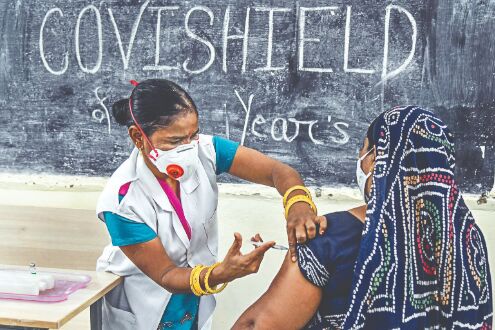SC pulls up Centre on Covid vaccines, asks if policy is to make states compete

New Delhi: The Supreme Court on Monday rapped the Centre over its rationale of the dual pricing and procurement of COVID-19 vaccines and posed tough questions, asking if its policy is to let states compete with each other for getting vaccines from private manufacturers.
According to Live Law, Solicitor General of India Tushar Mehta responded by saying that these are policy issues on which the court has limited judicial review power. To this, Justice Chandrachud said: "We are not framing policy. There's an order of April 30 that these are the problems. You will be flexible. You can't just say that you're the Centre and you know what's right. We have a strong arm to come down on this."
"The only thing we want to address is the dual pricing policy. You are asking the states to pick up and compete with each other," Justice S Ravindra Bhat said to Mehta.
The three-judge bench comprising Justices Chandrachud, L Nageswara Rao and Bhat asked the Centre to clarify if this is the policy of the Central government that the state or municipal corporation can procure the vaccine or the Union government is going to procure for them like a nodal agency.
The top court also observed that the Centre has failed to submit a national policy document on COVID-19 vaccines, news reports said. Therefore, it asked Mehta to place a policy document on record.
The Apex Court posed more questions to the Central government on the need for mandatory registration on CoWIN app.
"You keep on saying the situation is dynamic but policymakers must have their ears on ground. You keep on saying digital India, digital India but the situation is actually different in rural areas. How will an illiterate labourer from Jharkhand get registered in Rajasthan? Tell us how you will address this digital divide," the bench sought to know from Solicitor General Mehta.
It said: "You must smell the coffee and see what is happening across the country. You must know the ground situation and change the policy accordingly. If we had to do it, we would have done it 15-20 days back."
If people in urban centres are finding it difficult to get vaccine slots, what will be the fate of migrant labourers and villagers, the bench asked.
"This is a real fear amongst the people. I have gotten distress calls from people across the country, that they're not getting slots. They're all gone within seconds," Justice Bhat added.
Mehta replied that registration is mandatory as a person needs to be traced for a second dose and as far as rural areas there are community centres where a person can get registered for vaccination.
The bench also asked about the rationale for a different treatment to the age group 18-44 years with regard to vaccination, as the Centre is giving free vaccines only to the 45+ age group.
"Our issue is what is the basis for Centre to say that for 45+, we will provide vaccines free of charge, and for the rest, it will be procured at a charge. Two concerns are: You have constantly told us that the situation is dynamic. In the second wave, it was the pre-45 population that also suffered a great deal. Why should the Centre only procure for 45+ and leave the ones below on their own," Justice Chandrachud asked.
He further observed that not all people between the age group of 18 to 45 will be able to afford the vaccines.
"If this is the rationale, why do the states have to pay a higher price? You have to ensure that vaccines are available at the same price across the nation. You can't have a different price at the Centre and different at the states," Justice Chandrachud asked.
On April 23, in a letter to the states, Health Secretary Rajesh Bhushan said: "Citizens in the age group of 18 years to 44 years shall be eligible to receive vaccination, on payment, from any of the private CVCs (COVID Vaccination Centres)."
Some states, including Delhi, Maharashtra, Karnataka, Haryana, Odisha, Jharkhand and West Bengal are providing free vaccines to the people. However, the issue that remains is the unavailability of vaccines.
The top court has asked the Centre to file an affidavit in 15 days with its response to these questions regarding the country's COVID-19 vaccine policy.
The Supreme Court had earlier also raised pertinent questions over the Centre's vaccination policy, saying it's detrimental to the right to public health and equality. It had asked the Centre to revise the policy to be more in line with Articles 14 and 21 of the Indian Constitution.



